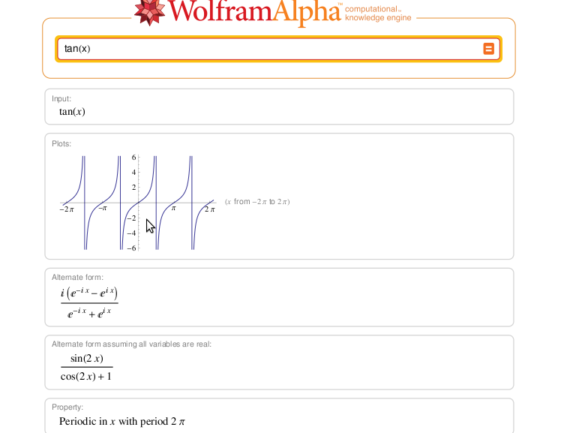First impressions of Wolfram Alpha.
I’m impressed! That sums up my initial feelings when I first started playing with Wolfram Alpha. As I played with it some more though it became apparent that this was wonderful project still needs a little work.
I knew that my friend Maria would get a crack at using Wolfram Alpha before I did so I checked her twitter feed to see what she thought about it. Astonishingly she uncovered a basic maths error – Wolfram Alpha tells us (at the time of writing) that the period of the tangent function is 2*pi when it is, in fact, pi. Digging a little further, I discovered that although it gives this incorrect result for the input tan(x),it gets it right for the input tan period.

A minor bug (that I have no doubt will be fixed soon) to be sure but it does show that you can’t always trust the output of any computational system as they’ll always have bugs. Check, check and check again.
It’s fun to see that even though Wolfram Alpha is a major project for WR, it doesn’t always take itself too seriously. For example, it was inevitable that legions of geeks around the world asked the question ‘What is the meaning of life?”. WA gamely returns what we all expect.

I’d love to know how many times that was searched for.
References to popular geek culture continue. For example, you get the following error message when Wolfram Alpha gets overloaded.

I was astonished by the number of different data-sets you can search. For example, it contains US birth data so I can learn that use of the name Michael for new babies is in decline and yet it is currently the 2nd most popular baby’s name in the US today.

Looking at the chart that WA provides me I see that Michael started to become a popular name in the mid-1930s and I suddenly wonder what happened around 1935 to make it so popular. Can any US Historians help me out?
Right, so I know that Michael is the 2nd most common name in the US according to WA but what is the most popular name? How can I get it to give me that? The following searches (and a load of others) didn’t help me (at the time of writing).
This was getting frustrating. So I googled it and eventually came to a page from the social secuity administration. It agreed with WA that the 2nd most popular was Michael and it also tells me that Jacob is the most popular (WA agrees). They disagree on the years though (WA-2007, SSA-2008).
I am bringing this up, not because I am obsessed with names, but because I felt that Wolfram Alpha should be able to compute this sort of thing for me with ease. I’m sure it can but I simply can’t come up with the right search term. As a related question – try getting Wolfram Alpha to tell you which food in it’s database contains the most Vitamin C. I couldn’t do it at the time of writing – let me know if you succeed.
Looking back at this post it seems that my first impressions have been all negative. On the contrary, I am astonished at what it can do and think that it is a major new technology – it just has some growing pains. The mathematical implications are so great IMHO that I’ll leave that to a separate post.
More first impressions of Wolfram Alpha I have found (list will grow with time):
- Maria is worried about the implications that Wolfram Alpha has for teaching math. It has sparked quite a discussion.
- A Disappointing First Look At WolframAlpha
- WolframAlpha – Not a Google Killer, But is a Serious Threat.
- Most Humorous Wolfram Alpha Response (as of yet)
- Wolfram Alpha – Should have called it Deep Thought! – Screencast of one user’s first experiences.
- Sound bites from the BBC.
Update(21st May 2009): The ‘period of tan(x) bug’ has been fixed. That was quick!

Thanks for the link! It seems that many people see it more negatively yet I think is is mostly because of all the pre-launch hype that occurred. I think we all expected more than we got finally.
Search as ” Name Michael” Returns 2nd.
Yeah I know. Um..That’s what I said in the post isn’t it?
I wasn’t able to get *any* of my non-mathematical searches to work. It kept giving errors or things I didn’t want.
I wasn’t expecting too much from the first iteration, but this needs a lot of work if they intend it to be popular.
Hi Jason. Any examples you’d care to share?
I tried using Mathematica-style input when natural language seemed to fail but that didn’t really work either.
I posted a rather tongue in cheek screencast of my initial experiences this morning – helped out by a rather facetious bunch of questions from Twitter followers: http://2020science.org/2009/05/16/wolfram-alpha-should-have-called-it-deep-thought/
Despite the fun though, I’m impressed! Can’t wait to see how it grows over the next few months.
Thanks Andrew. Keep the first impressions links coming people :),
Mike
I was doing a lot of ‘compare some stat between this country and this country’ but none of the stats I was interested in were available.
I’ve gone back and looked at individual countries and found the names for things and used that to get some results, although most included no temporal dimension (i.e. no better than thumbing through an almanac).
I did also try other things but I don’t remember exactly what.
Now that I could actually try it out, I’m starting to have my doubts about this fuzzy natural language syntax. It is not clear what the limits of the answering engine are (does a lack of answer mean that it didn’t understand the question or that it cannot answer the question?), and figuring out the appropriate input becomes (a sometimes frustrating) guesswork.
For example, I was trying to get a list of countries sorted by birth rate.
“birth rate” is understood as the total number of births per year. But I’m interested in births/(1000 people). No problem, Wolfram Alpha does not only search a database, it also *computes* answers, right? So let’s try “1000 * annual births/population”. It works! But the result is for the whole world, and I’d like to see a breakdown by countries. “annual births/population Mongolia” works too (let’s forget about that factor of 1000 for now), but that’s only a single country.
And this is the point where I got stuck …
All of the following return a list of countries:
“highest country by population”
“highest population”
“population”
Using birth rate/births/annual births instead of population works too. But as soon as I try something like “highest annual births/population”, WA refuses the understand the query … Even though this looks like something that WA is likely to be able to compute.
So where’s the problem? Is it that WA can’t compute the answer or that I’m asking the wrong question? Allowing (not enforcing) a more regular query syntax would certainly help here.
If anyone can figure out how to get the answer to this question from WA, please let me know!
Hi Michael, Much thanks for sharing with us your findings on the Wolfram Alpha. I’d like to add to your words that it sounds like, unfortunately, presently, a chance that you get a mathematically wrong answer from WA are quite sizable.
You may wish to find some Wolfram Alpha bugs here
http://groups.google.com/group/sci.math.symbolic/browse_thread/thread/098c8acfec0a279a/ab67130ee479efc5#ab67130ee479efc5
and here I was shocked with the reply by Daniel Lichtblau
http://groups.google.com/group/sci.math.symbolic/msg/e9c2f9165ebfb34f
and much pleased by the reply to DL from Martin
http://groups.google.com/group/sci.math.symbolic/msg/ab67130ee479efc5
Cheers, Vladimir